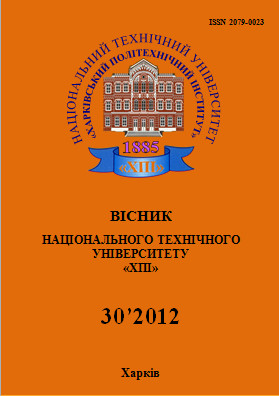Рекуррентная оценка продолжительности ожидания прогрессора в генетическом алгоритме
DOI:
https://doi.org/10.20998/%25xAbstract
Рассмотрен один из актуальных вопросов совершенствования генетических алгоритмов. Предложена процедура рекуррентной оценки продолжительности ожидания прогрессора – особи, обеспечивающей лучшее решение по сравнению с полученными ранее. Задача решена применительно к NP-полным комбинаторным задачам.References
Goldberg D. Genetic Algorithms / D. Goldberg. – MA: Addison Wesley, 1989. – 210 p.
Лысенко Ю. Г. Нейронные сети и генетические алгоритмы / Ю. Г. Лысенко, Н. Н. Иванов, А. Ю. Минц. – Донецк: ООО «Юго-Восток, Лтд», 2003. – 265 с.
Серая О. В. Многоиндексные модели логистики в условиях неопределенности / О. В. Серая. – Х. : ФОП Стеценко И. И., 2010. – 512 с.
Downloads
Published
2012-06-22
How to Cite
Дунаевская, О. И., & Ящук, Н. И. (2012). Рекуррентная оценка продолжительности ожидания прогрессора в генетическом алгоритме. Bulletin of National Technical University "KhPI". Series: System Analysis, Control and Information Technologies, (30), 83–88. https://doi.org/10.20998/%x
Issue
Section
SYSTEM ANALYSIS AND DECISION-MAKING THEORY
License
Copyright (c) 2016 Вісник Національного технічного університету «ХПІ». Серія: Системний аналiз, управління та iнформацiйнi технологiїAuthors who publish with this journal agree to the following terms:
- Authors retain copyright and grant the journal right of first publication with the work simultaneously licensed under a Creative Commons Attribution License that allows others to share the work with an acknowledgement of the work's authorship and initial publication in this journal.
- Authors are able to enter into separate, additional contractual arrangements for the non-exclusive distribution of the journal's published version of the work (e.g., post it to an institutional repository or publish it in a book), with an acknowledgement of its initial publication in this journal.
- Authors are permitted and encouraged to post their work online (e.g., in institutional repositories or on their website) prior to and during the submission process, as it can lead to productive exchanges, as well as earlier and greater citation of published work (See The Effect of Open Access).

